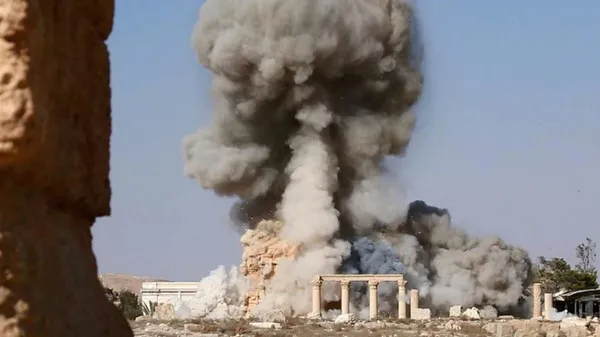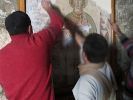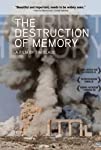Eye For Film >> Movies >> The Destruction Of Memory (2016) Film Review
The Destruction Of Memory
Reviewed by: Jennie Kermode

With debate still raging around the ethics of tearing down of statues and the proper way to preserve history, Tim Slade's documentary could not be more timely. Extending far beyond argument about controversial figures whose images still cause distress today, and beyond what might be transferred to museums, it looks at those buildings or monuments, centuries or millennia old, which form the cornerstones of living cultures even where their origins are unknown - those architectural wonders by which towns and even whole countries come to be known, and whose loss can leave communities unsure of their identity.
This isn't accidental loss. Beginning with the Second World War but making ample reference to other conflicts, Slade builds up a picture of how invading armies have systematically destroyed the landscapes that connect people to their history and thereby to their sense of who they are. He looks at the attacks by Daesh on the Buddhas of Bamiyan and the temples of Palmyra, the destruction of the Stari Most bridge by Croat paramilitaries and the bombing of Dresden on the orders of Winston Churchill. What motives lie behind these incidents? Whilst putting forward the arguments made by the attackers in each case, he argues that ultimately they caused the same kind of harm and that this is intentional.

The film (and the book it's based on) were inspired, in part, by the work of Raphael Lemkin, who coined the term genocide and argued consistently that cultural destruction should be treated as a war crime because it's part of how societies are destroyed, those who survive physically left with a much reduced sense of connection to one another. There's a strong focus on the development of this idea in international law and the struggle to get it formally recognised, which will be useful to those studying or working in related areas. Balancing this academic aspect is a selection of interviews with people directly affected who, though they also have professional connections to the subject, also add an important human element. In among this are the stories of those who lost their lives defending artefacts, and those whose work today involves teaching or learning means of concealing and protecting architectural treasures.
What about reconstruction? There are differing views on that. The film takes in efforts to reconstruct ruined cities exactly as they were but also looks at ways of commemorating the destruction itself, such as the memorial on the former site of the World Trade Center in New York, exploring the merits of both. There's a lot of optimism in these scenes, celebrating resilience and the way that loss can itself become a part of cultural history without diminishing a people's spirit.
There's a lot of expertise on display here and the discussion between people who have worked to preserve history throughout their lives makes an interesting contrast to the emotive debates one sees about these subjects online. Whilst stressing the importance of preservation, there's an acceptance of change as the order of things and a focus on ways of living with that, trying to work around it. It might have been useful to include more historical context, looking at the use of this type of destruction centuries ago, but with such a huge subject, something is always going to be left out. This is still a valuable contribution to public understanding of history itself.
Reviewed on: 02 Aug 2020


















